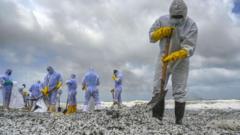**The Indonesian government has recently revoked mining permits in Raja Ampat amid growing concerns over environmental damage, but the balance between economic growth and ecological preservation remains delicate.**
**Mining for Metals Endangers Indonesia's Marine Ecosystem**

**Mining for Metals Endangers Indonesia's Marine Ecosystem**
**Rampant nickel mining threatens the pristine biodiversity of Raja Ampat, raising environmental concerns amid a push for electric vehicle production.**
Global Witness reports stark imagery from Indonesia's Raja Ampat archipelago, often termed the "Amazon of the Seas," revealing significant environmental degradation due to nickel mining, crucial for electric vehicle batteries. The Indonesian government recently revoked permits for four out of five mining companies in the region, a move welcomed by environmental activists.
In a statement, the Ministry of Environment highlighted Raja Ampat's ecological importance, emphasizing the need to safeguard its biodiversity. Nonetheless, investigative photos from Global Witness document extensive forest loss and sediment contamination in waters rich with coral reefs. Since 2020, land utilized for mining has increased by 500 hectares, equivalent to about 700 football fields.
While the government's decision has encouraged conservationists, concerns loom that it might be contested legally by mining companies. One operator remains active on Gag Island, known for its abundant nickel deposits. Dr. Mark Erdmann, a coral reef conservationist, praised the revocation of permits, attributing it to public outcry from Indonesians.
This controversy underscores the environmental challenges tied to the surging demand for critical minerals necessary for technological advancement in clean energy. With over half of the world’s nickel produced in Indonesia, mining impacts extend beyond Raja Ampat, contributing to ecological damage across various regions.
A 2024 report highlighted mining's correlation with local forest depletion leading to flooding and landslides. Although some studies indicate minimal poverty reduction from mining activity, they also reveal a decline in environmental quality, including air and water pollution.
Imam Shofwan from the Jakarta-based environmental group Jatam remarked on the paradox of nickel mining—promoted as a climate solution yet contributing to deforestation and threats to farming and fishing livelihoods. Dr. Erdmann lamented the dilemma of balancing economic demand for nickel with the potential ecological toll, emphasizing the importance of assessing acceptable environmental damage in the transition toward electrification.
The complexity of Indonesia's positioning in the global nickel market raises crucial questions about the local consequences of mining, particularly regarding climate vulnerability in coastal areas. As the narrative unfolds, the inherent conflicts between industry and conservation continue to be a focal point for discussions surrounding sustainable development.
In a statement, the Ministry of Environment highlighted Raja Ampat's ecological importance, emphasizing the need to safeguard its biodiversity. Nonetheless, investigative photos from Global Witness document extensive forest loss and sediment contamination in waters rich with coral reefs. Since 2020, land utilized for mining has increased by 500 hectares, equivalent to about 700 football fields.
While the government's decision has encouraged conservationists, concerns loom that it might be contested legally by mining companies. One operator remains active on Gag Island, known for its abundant nickel deposits. Dr. Mark Erdmann, a coral reef conservationist, praised the revocation of permits, attributing it to public outcry from Indonesians.
This controversy underscores the environmental challenges tied to the surging demand for critical minerals necessary for technological advancement in clean energy. With over half of the world’s nickel produced in Indonesia, mining impacts extend beyond Raja Ampat, contributing to ecological damage across various regions.
A 2024 report highlighted mining's correlation with local forest depletion leading to flooding and landslides. Although some studies indicate minimal poverty reduction from mining activity, they also reveal a decline in environmental quality, including air and water pollution.
Imam Shofwan from the Jakarta-based environmental group Jatam remarked on the paradox of nickel mining—promoted as a climate solution yet contributing to deforestation and threats to farming and fishing livelihoods. Dr. Erdmann lamented the dilemma of balancing economic demand for nickel with the potential ecological toll, emphasizing the importance of assessing acceptable environmental damage in the transition toward electrification.
The complexity of Indonesia's positioning in the global nickel market raises crucial questions about the local consequences of mining, particularly regarding climate vulnerability in coastal areas. As the narrative unfolds, the inherent conflicts between industry and conservation continue to be a focal point for discussions surrounding sustainable development.




















